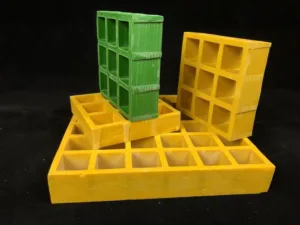In industries and environments where safety, durability, and cost-effectiveness are paramount, Fibergrate fiberglass grating stands out as a remarkable solution. This innovative material has gained immense popularity for its exceptional properties and wide-ranging applications. In this guide, Unicomposite composite profiles will delve into the incredible benefits that Fibergrate fiberglass grating brings to the table.

fibergrate fiberglass grating
Introduction
Fibergrate fiberglass grating has revolutionized the industrial landscape, offering a range of remarkable advantages that traditional materials can’t match. From its robust durability to its impressive versatility, Fibergrate fiberglass grating has proven to be a game-changer in various sectors.
Unveiling Fibergrate Fiberglass Grating
Fibergrate fiberglass grating is a composite material crafted from reinforced fiberglass and resin. This ingenious combination results in a product that is not only lightweight but also incredibly strong and durable. The grating is available in various configurations, catering to different load-bearing requirements and environments.
The Advantages of Fibergrate Fiberglass Grating
Enhanced Durability
One of the standout features of Fibergrate fiberglass grating is its exceptional durability. Unlike traditional materials such as steel or wood, fiberglass grating resists corrosion, chemicals, and environmental stressors, ensuring a prolonged lifespan even in harsh conditions.
Impressive Strength-to-Weight Ratio
Fibergrate grating’s high strength-to-weight ratio makes it an ideal choice for applications that require load-bearing capacity without unnecessary bulk. This advantage not only simplifies installation but also reduces overall structural weight.
Corrosion Resistance
Traditional materials are prone to corrosion, which can compromise structural integrity. Fibergrate grating’s corrosion resistance ensures that it remains unaffected by moisture, chemicals, and corrosive elements.
Slip-Resistant Surface
Safety is paramount in industrial settings, and Fibergrate grating addresses this concern with its slip-resistant surface. This feature reduces the risk of accidents, making it suitable for areas prone to moisture or oil spillage.
Applications Across Various Industries
Manufacturing Sector
In manufacturing facilities, Fibergrate grating finds extensive use in walkways, platforms, and elevated structures. Its durability and resistance to chemicals create a safe working environment.
Commercial and Public Spaces
Fibergrate grating’s aesthetic appeal and low maintenance make it a preferred choice for public spaces like parks and commercial buildings. Its slip-resistant surface adds an extra layer of safety.
Oil and Gas Industry
The oil and gas sector benefits from Fibergrate grating’s corrosion resistance and fire-retardant properties. It’s widely used in offshore platforms and processing plants.
Customization and Versatility
Fibergrate grating can be tailored to specific project requirements. From mesh sizes to colors, customization options are vast, allowing for seamless integration into various design concepts.
Installation Made Easy
Quick and Hassle-Free Assembly
Unlike heavy steel grating, Fibergrate grating’s lightweight nature makes installation a breeze. This translates to reduced labor costs and shorter project timelines.
Low Maintenance Requirements
Fibergrate grating’s resistance to rust and corrosion minimizes maintenance efforts, resulting in long-term cost savings.
Comparative Analysis with Traditional Materials
When pitted against materials like steel and wood, Fibergrate grating shines through with its longevity, cost-effectiveness, and overall performance.
Economic Advantages
Longevity and Cost Savings
The extended lifespan of Fibergrate grating means fewer replacements over time, leading to significant cost savings in the long run.
Reduced Installation Costs
Its lightweight composition means that fewer labor resources are required during installation, contributing to reduced project expenses.
Environmental Friendliness
Recyclable and Sustainable
Fibergrate grating is eco-friendly due to its recyclable materials and manufacturing process, aligning with sustainable practices.
Lower Carbon Footprint
Compared to energy-intensive materials like steel, the production of Fibergrate grating results in a lower carbon footprint.
Safety Considerations
Fire Resistance
Fibergrate grating’s inherent fire resistance makes it a safe choice for environments where fire hazards are a concern.
Electric Insulation
The non-conductive nature of fiberglass makes Fibergrate grating an excellent insulator against electric currents.
Factors Influencing Product Selection
Load-Bearing Requirements
Selecting the right grating configuration is crucial based on the load-bearing capacity needed for specific applications.
Chemical Exposure
In environments where chemicals are present, Fibergrate grating’s resistance to corrosion makes it a reliable option.
Maintenance Best Practices
Regular inspections and basic cleaning are the key to maintaining the integrity and performance of Fibergrate grating over time.
Case Studies: Real-Life Applications
Maritime Environments
Fibergrate grating’s resistance to saltwater and harsh maritime conditions makes it a preferred choice for docks and ship decks.
Chemical Processing Plants
In facilities with chemical exposure, Fibergrate grating’s corrosion resistance ensures safety and longevity.
Future Trends and Innovations
As technology advances, Fibergrate grating is likely to see further enhancements in terms of material composition, customization options, and application versatility.
Conclusion
Fibergrate fiberglass grating stands as a testament to innovation and practicality. Its diverse advantages, from durability to customization, make it an indispensable solution across various industries. Embracing Fibergrate grating means embracing safety, sustainability, and long-term cost-efficiency.
Frequently Asked Questions
- Is Fibergrate grating suitable for outdoor applications?
- Yes, Fibergrate grating’s corrosion resistance and slip-resistant surface make it ideal for outdoor environments.
- Can Fibergrate grating be used in areas with high chemical exposure?
- Absolutely, Fibergrate grating’s resistance to corrosion makes it a reliable choice for areas with chemical exposure.
- What maintenance is required for Fibergrate grating?
- Regular visual inspections and occasional cleaning are generally sufficient to maintain Fibergrate grating’s performance.
- How does Fibergrate grating compare to traditional steel grating in terms of weight?
- Fibergrate grating is significantly lighter than traditional steel grating, making it easier to handle and install.
- Is Fibergrate grating a sustainable choice?
- Yes, Fibergrate grating’s recyclable materials and lower carbon footprint contribute to its environmental friendliness.




























